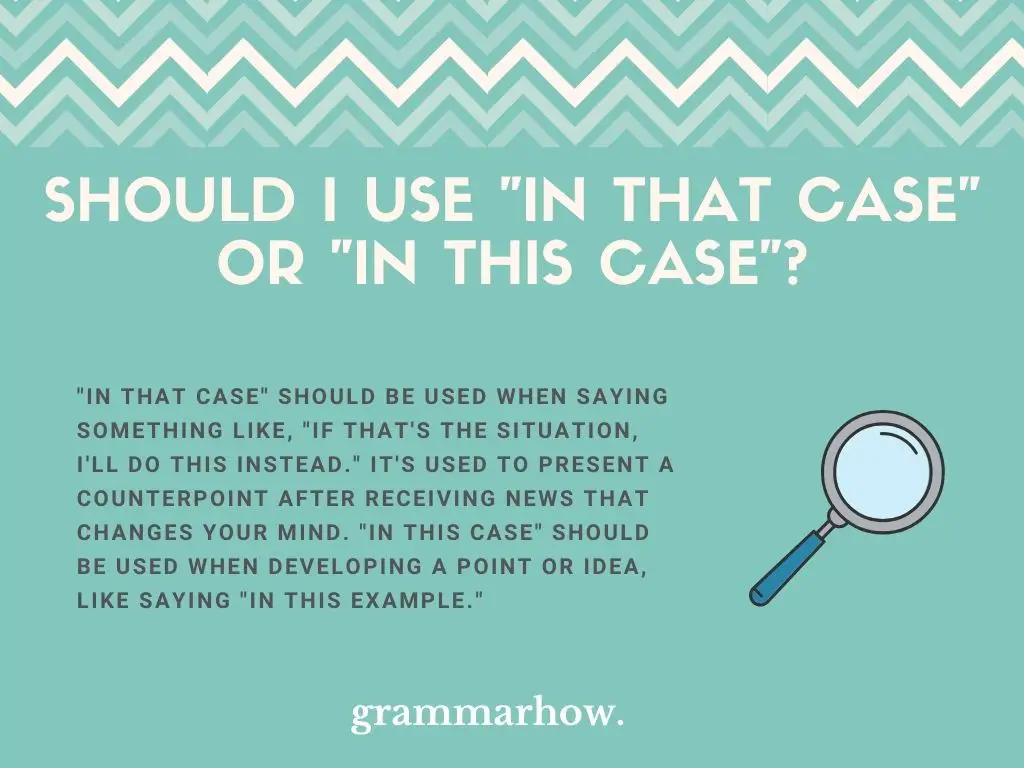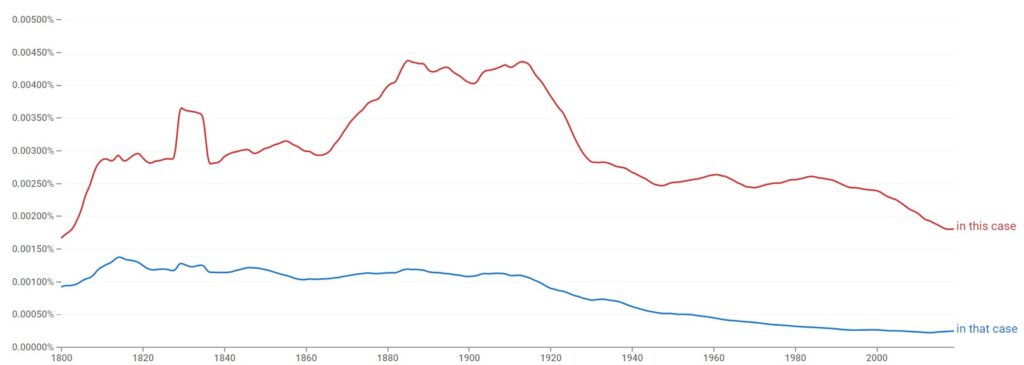The phrases “in that case” and “in this case” are much more different than you might realize. While only one word is different in the overall phrase, it’s quite an obvious difference when you look at the sayings. In this article, we’ll explain what that difference means.
Should I Use “In That Case” Or “In This Case”?
“In that case” should be used when saying something like, “if that’s the situation, I’ll do this instead.” It’s used to present a counterpoint after receiving news that changes your mind. “In this case” should be used when developing a point or idea, like saying “in this example.”

Generally, “in that case” is used more in speaking because we’re reacting to some information that’s only just been presented to us.
- We’re sorry, but we’ve run out of your favorite beer!
- In that case, I’ll have the wine.
As you see, we’re presented with a problem and say “in that case” as if we’re saying that we’ve changed our mind based on the information provided.
However, when we use “in this case,” it’s much more likely to see it in writing. That’s because it’s used to elaborate points or to expand on a situation.
- Sometimes my manager makes me work late. In this case, I got away with it, but I might not be so lucky again.
- Sometimes our printer runs out of ink. In this case, we must write out all of our forms manually.
“In this case” is used when we are directly responding to a point or situation we just presented in the previous sentence.
Is “In That Case” Or “In This Case” Used The Most?
We think it helps to learn which of the two phrases is more commonly used. We’ve referred to the uses of the two words in literature and managed to come up with some conclusive results.
If you look at this graph, you’ll see that “in this case” is the more popular choice in writing. However, this graph only applies to written words, which is why “in this case” is so popular. If this was a graph for spoken English, “in that case” would be by far the more popular choice.

If we overlook the bias of writing favoring “in this case” to elaborate on points, then we’ll see that both of the phrases are fairly commonplace. While one might be used more frequently than the other, it’s still acceptable to use them both in certain situations.
Should You Place A Comma After “In That Case” Or “In This Case”?
Generally, when we use the phrases “in that case” or “in this case,” we have to pay attention to the comma and grammar rules that come with it.
You should place a comma after both phrases. They work as their own separate clause to introduce a new idea, meaning they need a comma to help break up the flow of the sentence.
- In that case I’ll have something else.
- In that case, I’ll have something else.
As you can see, “in that case” requires a comma to break up the sentence. It’s a clause that works to introduce a new point after the information we’ve just heard. That’s why the comma is important.
7 Examples Of How To Use “In That Case” In A Sentence
Let’s check out some examples of “in that case” in action. Remember, it’s more common to come across this saying in spoken English, so we’ll focus mostly on the conversation over anything else.
- I’m sorry, but we’re all out!
- In that case, I’ll try something new.
- Sorry, sir, but the zoo is closed.
- In that case, I’ll go elsewhere.
- There’s nothing more we can do.
- In that case, you’ve lost a valuable customer.
- I can’t help you anymore.
- In that case, I’ll find someone else.
- We’re closing soon.
- In that case, I’ll hurry up.
- We don’t offer those services here.
- In that case, I’ll look at something else!
- We don’t have what you’re asking for!
- That’s a shame. In that case, what do you recommend?
7 Examples Of How To Use “In This Case” In A Sentence
Now let’s see when it’s more appropriate to use the written phrase “in this case.” Remember, this one doesn’t need a conversation because it’s a written phrase. It develops from the previous situation.
- Sometimes my mother is home late. In this case, I make my own dinner.
- Sometimes it’s hard to find my way back. In this case, I use my GPS on my phone.
- Sometimes I can’t relate to my girlfriend’s problems. In this case, I go to the spare room and chill.
- Sometimes I find myself staring into space. In this case, I’m often pondering existential things.
- There’s plenty to do in the capital city. In this case, we’re going to refer you to the museum, as it’s the point of the journal.
- Sometimes you can’t find what you’re looking for. In this case, we recommend looking elsewhere or trying some other time.
- Sometimes we need extra hands on deck. In this case, I pay overtime for anyone who helps.
“In This Case” And “In That Case” – Synonyms
Alternatives and synonyms are great to help you expand your knowledge of the words.
- As a result
We can use this in a more formal situation to say, “if that’s the case, then I’ll do this.”
- Then
This is a simple response that also works to replace “in that case.”
Is It “In This Case” Or “On This Case”?
“In this case” is correct when you want to develop a situation you’ve mentioned previously. “On this case” is only correct when you’re talking about something being physically on top of a case (like a briefcase).
Is It Ever Correct To Use “In Case”?
“In case” is a correct phrase that means we do something as a precaution for something else.
- We packed warm clothes, in case it got cold.
- In case you weren’t aware, we’re not together anymore.
Is It Ever Correct To Use “In The Case”?
“In the case” is a correct phrase that means “regarding” or “in that instance.” It’s similar to “in this case,” but more specifically related to one matter.
- In the case of burnt food, you can always reorder it.
You may also like:
10 Good Synonyms For “In This Case”
“It Is Not The Case” – Meaning Explained (With Examples)

Martin holds a Master’s degree in Finance and International Business. He has six years of experience in professional communication with clients, executives, and colleagues. Furthermore, he has teaching experience from Aarhus University. Martin has been featured as an expert in communication and teaching on Forbes and Shopify. Read more about Martin here.
